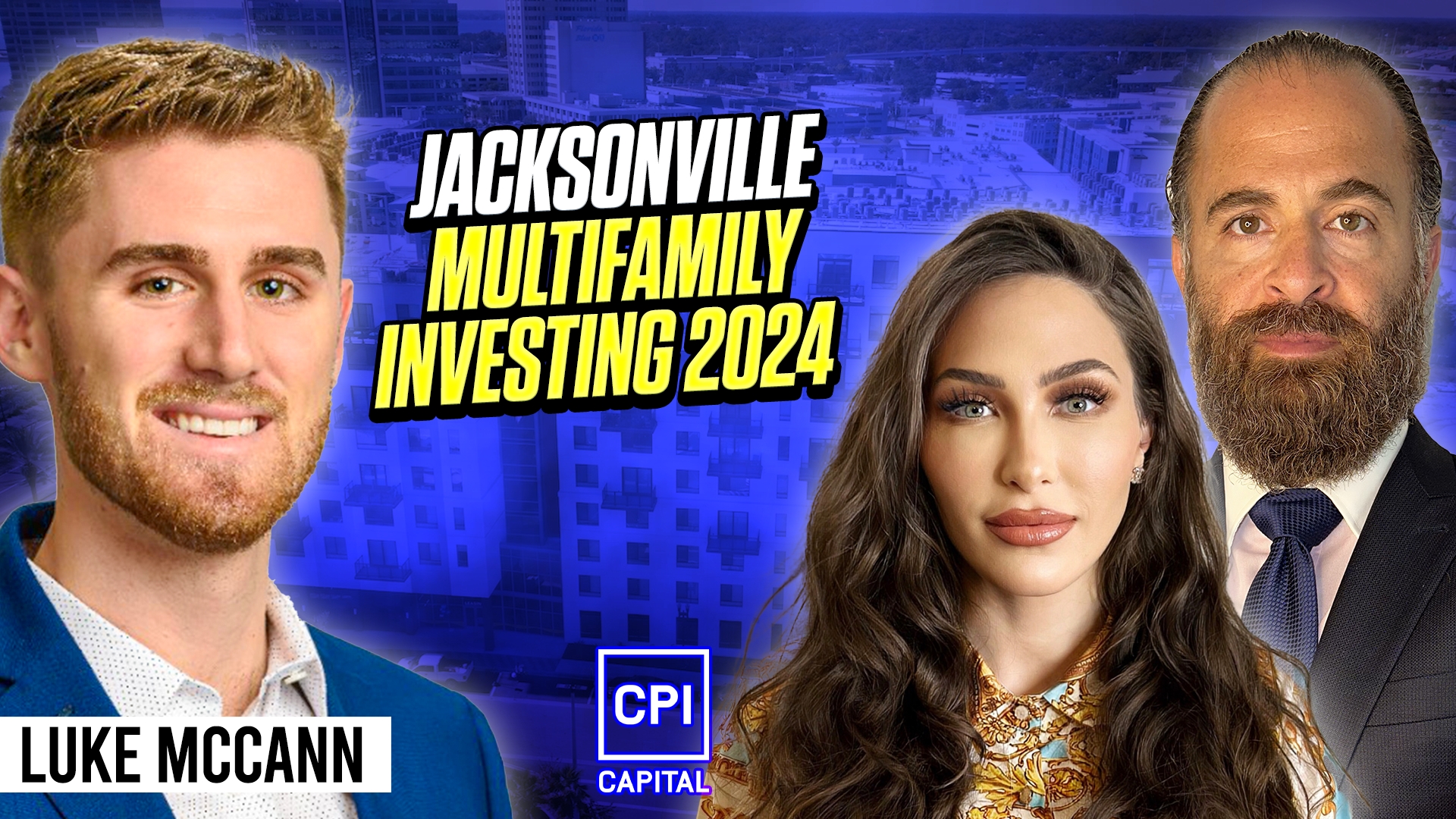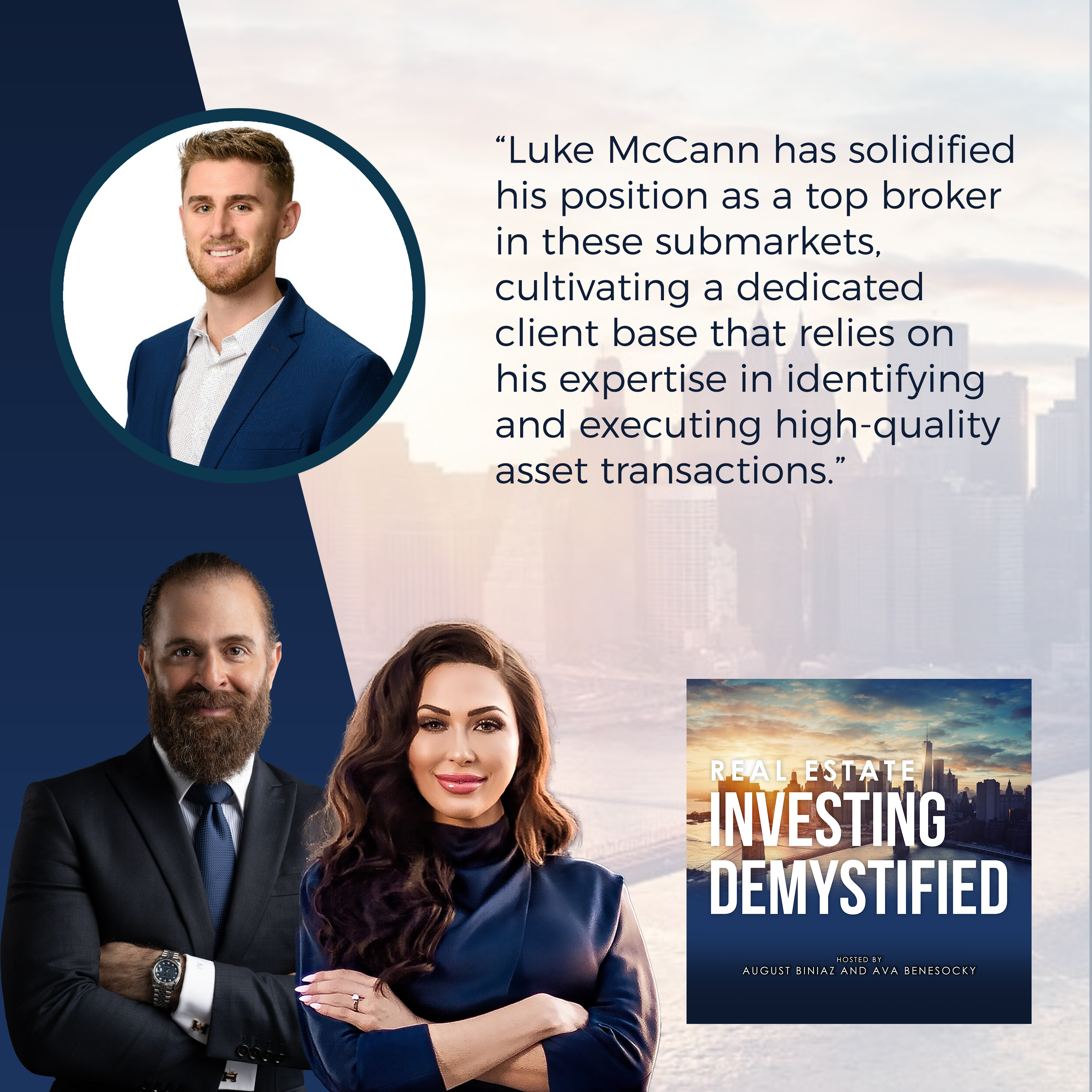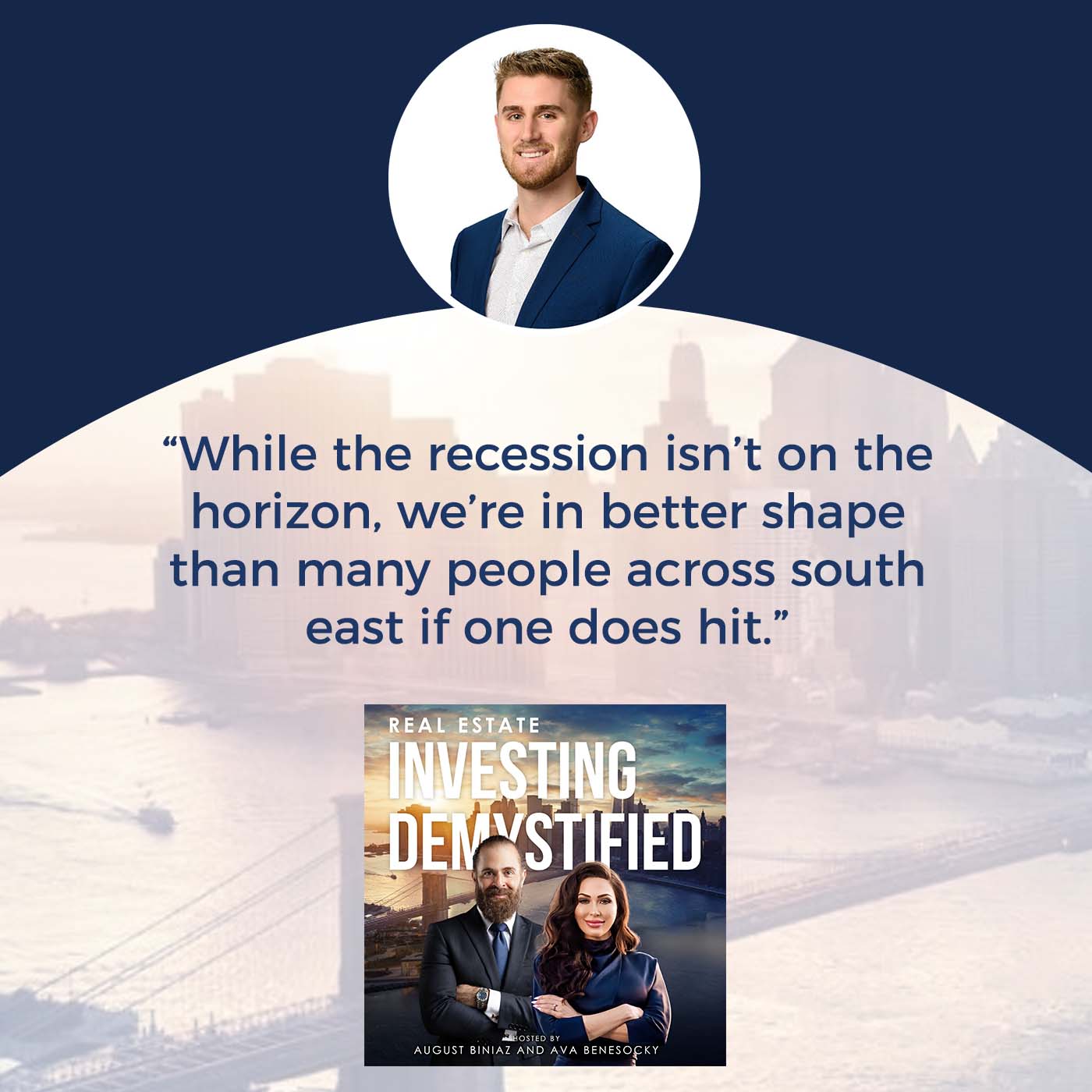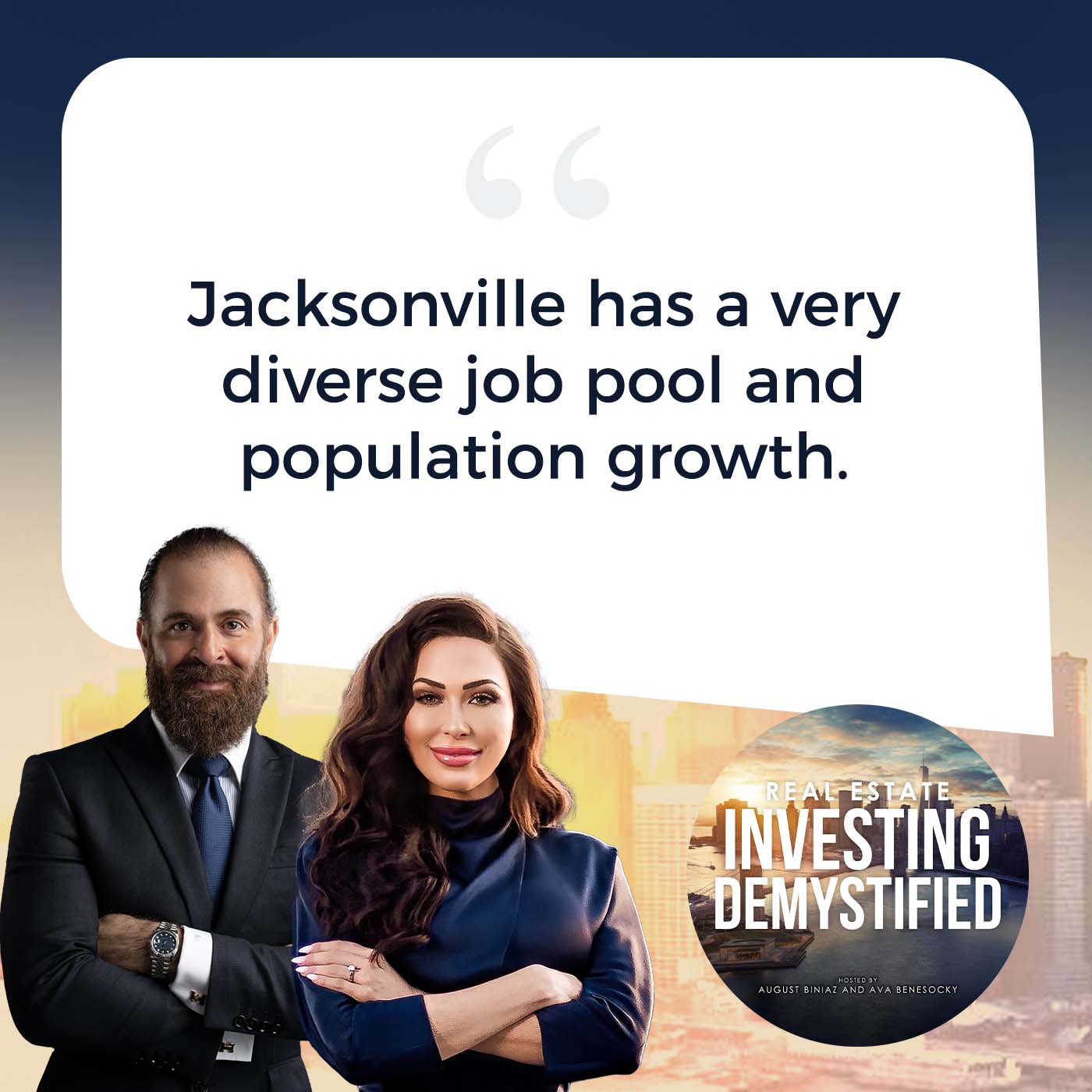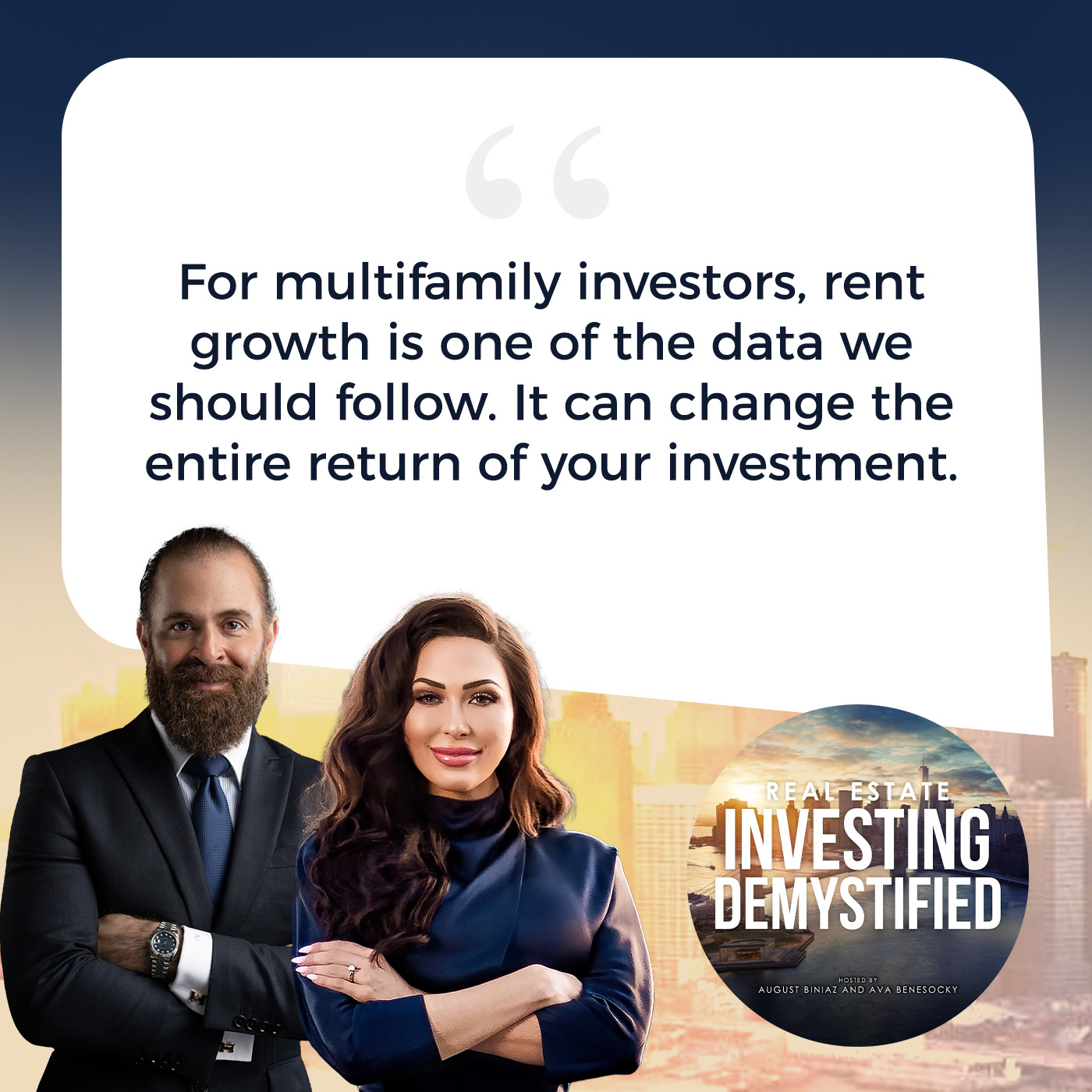Are you thinking about investing in Jacksonville real estate? You’ve come to the right place! In today’s conversation with Luke McCann, a leading broker, we dive into the booming market of North Florida’s largest city. The Jacksonville real estate market is experiencing a temporary period of oversupply, leading to flat or declining rents. However, the future looks bright with a significant decrease in new construction and strong underlying factors that indicate future growth (positive growth fundamentals). This is expected to lead to a return to rent growth by the end of 2025. Join Luke McCann today as he unpacks the latest data and trends shaping Jacksonville Multifamily in 2024.
Get in touch with Luke McCann:
If you are interested in learning more about passively investing in multifamily and Build-to-Rent properties, click here to schedule a call with the CPI Capital Team or contact us at info@cpicapital.ca. If you like to Co-Syndicate and close on larger deal as a General Partner click here. You can read more about CPI Capital at https://www.cpicapital.ca/.
#avabenesocky #augustbiniaz #cpicapital
—
Watch the episode here
Listen to the podcast here
Important links
- Luke McCann – LinkedIn
- NAI Hallmark
- Rich Dad Poor Dad
- Peter Linneman – Past Episode
- The One Minute Millionaire
- LM@NaiHallmark.com
- https://www.NaiHallmark.com/Team/Luke-McCann
About Luke McCann

Jacksonville Multifamily Investing 2024 – Luke McCann
We have a commercial broker on our show. I’ve never been a commercial broker, but I’ve been a residential real estate agent.
The same here. I’ve been a residential real estate agent. I know many of them. A lot of my friends are residential brokers. It seems to be a common thing to do particularly in Florida where our focus market. Our good friend that’s going to be presenting is from that state. Everybody is a real estate agent in Florida, but there is a significant difference between commercial real estate agents and residential real estate agents. I’m going to demystify that.
Full disclosure, when I was 22 years old and I took the real estate course, I had to get residential commercial and rule. When I took the commercial section, it was difficult. The commercial is a very difficult space to be in. I love that we have Luke on our show.
To touch on this a little bit more, in residential, the processes are a lot their friend. You get a realtor, list the house, you put it on MLS, buyers come in, they put an offer, the offer is with the purchase and sale agreement. The highest offer gets the property, but in a commercial that’s not the case their relationship with brokers is tremendously important and the highest offer doesn’t always get the property. Brokers have such a level of influence and they’re very sophisticated. A lot of these guys have MBA’s and there are college graduates. It’s not like a side gig, no disrespect to residential brokers.
These guys are very sophisticated. Talking about sophistication, when we started the CPI Capital and building our acquisition infrastructure and we decided on Florida being our target and focused market, we wanted to build those relationships with the brokers in the regions. One of those cities was Jacksonville, a city that we’re going to go into detail about in our conversation. We wanted to build relationships with the brokers. This wasn’t superficial getting on calls or calling them. This was going there, meeting them breaking bread with them, and connecting them with our personal level.
It is extremely important.
When deals do come through, we have them as our advocates there. It helps us close deals. While we were in Jacksonville and Paul Hawkins was director of acquisitions, we’ve met Luke multiple times in the past, but he did a presentation for us in their beautiful offices. They stuck with me because it was such a comprehensive presentation about Jacksonville. I fell in love with the city even more Jacksonville was the largest city by land mass in the US. There are belts and roads that go around. You can get anywhere in the city, but we’ll get Luke to touch on that bit more. Is there anything else we need to cover?
I’ll do a quick background about Luke and then we can dive in on how important that actual relationship is with the broker. We can break everything down a little bit about Luke. Luke is a real estate broker specializing in multifamily investment sales for NAI Hallmark in Jacksonville, Florida, with an array of real estate experience with an emphasis on infill or high barrier-to-entry submarkets, selling land and value at apartment communities. In a short period of time, McCann has established himself as one of the leading brokers in these submarkets building a loyal client base who trust his ability to identify and execute on high-quality assets. Thank you so much for being here on the show, Luke.
It’s an honor. Thanks for having me. I’m excited to do this.
Let’s dive in. Tell us what interested you about commercial real estate and how you get started in this.
Before we get into the relationships with the importance of brokers, how do you even get into commercial real estate?
I was fortunate to be exposed to real estate in general at a young age. I read all the books, that I’m sure you guys have the Rich Dad Poor Dad out there, believed in it first as a wealth vehicle and knew that long-term no matter what I did for a career, that was something that I wanted to have my hands in. I got licensed as soon as I could a couple of months after I turned eighteen while I was in school, I took a winter break and thought I could spend the next few weeks off doing whatever I wanted and why not go do something productive.
I picked up the license and started while I was in college thinking, “Where’s the opportunity?” I don’t know much about real estate. I’m not super well connected at that young of an age. I thought, “Where’s the low-hanging fruit.” I’ve always been very analytical in that way sitting through data trying to find Trends and whatnot. I found my way into the infill land space connecting builders with vacant lots. I sold a few single-family homes along the way but quickly learned that’s not something that interested me. I found more enjoyment in selling to builders and investors who were bottom-line oriented as home buyers who could get caught up in things like drapes, countertops and whatnot.
I found my way into multifamily because I thought it was the easiest asset class to understand. Click To TweetThere’s certainly value in that, but it didn’t necessarily align with my personality type. Along the way, I found my way into multifamily, because I thought it was the easiest asset class to understand. I was living in an apartment building. I figured, “Why not start cold-calling these things?” I started again in space under 50 unit deals, 8 units here and 16 units there. I started to build that up. As I got out of college, moved closer to home continued that same process nothing sexy, just cold calling, letter writing and doing what I could to build up a book of business, but 16 units turned into 40 units, turned into 80 units, moved from the boutique firm that I was at out in Jacksonville Beach to where I’m at now at NAI.
They previously had no multifamily presents here, but they tabbed me and my colleague John Rutherford to come over here with a support team, handed us the reins and said, “You can leverage our brand, but otherwise call us when you need us.” We’ve built out something here. I think it’s pretty special our own company within a company, very much start-up culture energy were in early, we stay late trying to constantly add value in every way that we can along the way to hires and sellers alike and have complete control over.
It’s unique and that way where we’re at NAI which is a global brand, people generally recognized it all though, it’s predominantly an office and Industrial leasing sales. That’s largely the presidents that NAI has versus some of our competitors that may have more of a mainstay and known brand in the multifamily space. We’ve had to come in and we always say we got to work twice as hard to be half as good, relative to some of our competitors, but we like to think that all the value we’re creating and passing along to our clients gets recognized and that way as well.
Were you born and raised in Jacksonville?
Yes, born and raised in Jacksonville Beach.
You’re talking about adding value to your clients. It’s the level of sophistication that you have about understanding the city’s path of progress and other items that excited us, but before getting into that and your crash course, you’re going to give us a black Jacksonville and focus somebody on multifamily commercial real estate, let’s talk about the importance of brokers. I think this is very important to emphasize because we’ve tried to do deals here for over the last couple of years since Paul Hopkins, our Director of Acquisition joined the team, and we’re tracking deals. As we get involved in deals, they come into our pipeline. We have a software Asana that we tracked a lifetime of the deal.
We track them with if we wrote an LOI, did the deal trade, they make it to the best and final if it did trade who bought it, what was it bought at. Some of these are not on the record, but we watch it through the whole thing. At a time, we see that sometimes deals don’t get traded. Sometimes there are retrace that are done by buyers, the highest price doesn’t get it. There are many things that go there but talk to us about your experience. Some of the data that Paul has collected is that over in Florida, almost 50% of the deals that have come into the market are either not awarded or fall through. They don’t they don’t finally trade.
This is why it’s scary for sellers and this is why we’re going to talk about the relationship with you guys. It’s a $20 million asset. The seller worked hard for years to put Equity into the property. They have a decent property now and then you put it for sale, you’re trying to transact and then you’re trying to get the best price possible. What we see over the last little bit here and what August was mentioning is that the brokers advise the seller, “Don’t always go with the best price because that’s a group. They might not be able to close on the property or raise the capital.” The biggest part for sellers is they pick a buyer, that buyer can’t close and then now there’s a little stigma on that property. It’s a little bit maybe or it is held up for many months and maybe it doesn’t go through.
The Acquisition Process
That’s what happened at our current deal in Tampa, a deal fell through twice and we were able to come in on an off-market process. Talk to us about the acquisition process of the syndication cruise, and groups that have to go out to raise money from retail.
How much due diligence do you do on the buyer to make sure that you are supporting your seller and say, “I’m confident these guys have a track record. I’m confident that they’re going to be able to close so that you’re not putting a bad situation.”
It all stems from the fact that commercial real estate by nature is a very illiquid asset. This isn’t e-Trade where you can go on and when you want to sell, press the button and it’s gone. The illiquid nature of commercial real estate presents challenges certainly, especially for sellers, but by nature, that creates opportunities for brokers and specialists like us to come in and smooth out the Kinks in that process, especially where there’s a ton of market volatility, making sure that the learning curve is shortened and your sourcing buyers that can execute is as important as ever.

Jacksonville Multifamily: Commercial real estate, by nature, is a very illiquid asset. This isn’t e-Trade where if you want to sell, you can just press the button and it’s gone.
On top of that, especially with any move in the market cycle, the buyers that are coming into the market nowadays are very different from those who were coming into the market a short time ago, which is natural with every market cycle. I can give you maybe some insight into our process and how we qualify buyers in a competitive bid process and maybe there are some tips and insights in there that the folks can uncover. Our process is very regimented and we’ve adjusted it over time but we found that it can yield some pretty good results.
It can take upwards of a month, sometimes longer to pull a full listing together. That requires a lot of diligence upfront which helps everybody throughout the process, especially buyers because we’ve gone through dozens if not hundreds of marketing processes. We know the questions that are bound to come up. We want to have all those answers to the tests upfront. It makes it easier for everybody in the back end and it can accelerate the study for buyers and that process as well once we have all that stuff together. We’ve got us the along we’ve got the financials and supporting material everything in the area that we need to know about a “debt” and “insurance” up front. We want to have all those answers up front before launch.
You do it as if you’re buying the property yourself, the same things we do.
We’re Not Just Selling Buildings, We’re Selling Business Plans
We’re not just selling buildings. We’re selling business plans. When we take a deal out to market, we want to be able to articulate that to any buyer because they’re going to have to set their own business plan as us, especially since we know this area. I’ve learned longer than I’ve been in the business that being born and raised in your own market is Increasingly rare. I didn’t think it would be that way, but it sounds more rare than not. We want to share that insight with you all in that way. We’ve got all that up front to make sure that when we do send the deal out, the buyers have all the answers that they need to plug it into their model, make sure it passes the initial litmus test, and then throughout that process it’s typically a 3 to sometimes 4-week marketing process. We’re actively touring the entire time and sharing a ton of underwriting questions about the area getting underwriting calls.
We're not just selling buildings. We're selling business plans. Click To TweetWe’re feeding weekly updates to our seller clients and this process, “Here’s who’s toward this week. Here was the general feedback. Here, maybe some adjustments we need to make along the way,” and then that all culminates and a call for offers usually a specific date 3 to 4 weeks after launch where we bring the process to a close. We say, “Everybody, that has an interest submit in LOI. This might be a good opportunity to take time to mention now I think more than ever submitting LOIs if you’re not at the guidance can help people that are trying to break into new markets,” whereas a few years ago, we may have had 30 or 40 offers on a deal and moved 10 to 12 into a highest and best.
Those offer sheets as a result of where we’re at in the marketing process can be smaller now. What may be a note today, may later turn into a yes or may serve as a data point for us as brokers to go back to on different deals. I can tell you we’re very data-driven. We keep track of everybody who executes CAs on our deals. We make a note of everybody who submits an LOI on our deals, and we track all That data. When we bring out our next deal or if we have an off-market opportunity, the first place that we’re going to go to build that list out other than who’s top of mind is going to be, “Who’s offered on our deals recently?” whether they’ve been competitive or not because that shows us that the interest is here.
They’re up to tune with where the market is now. The learning curve for them on the next deals is likely going to be shortened because they’ve studied the right comps. They’ve studied the sales comps. They know generally where the expense profile is going to land on the deal and it can make for a quicker process. Getting back to the actual marketing process for us, we’ll get to the call for offers date. We’ll put an offer matrix together and present it to the seller, usually from the air if it’s a competitive process where we’ve got at least a handful of offers that are within range of the guidance will go back to everybody and set up essentially a cutoff for what we call a round of highest invest that can be 2 groups or 22 groups. It depends on the level of interest in the asset.
It’s that weak that we spend working through the highest and best we get into the nitty-gritty with the buyer and do what she mentioned before with a lot of the qualifying because at the end of this process when the seller comes to us and says, “Who do you recommend you we award the deal too?” we want to have full confidence in that buyer that they’re going to execute because there’s a lot of reasons to not do a deal now. There are a lot of headwinds that buyers are facing. We want to make sure that a lot of those road bumps that we use brokers have seen a million times that are bound to come up. We want to smooth those over the best we can.
Those things like, “What are you assuming on insurance?” If they’re assuming that they’re going to get an “insurance” at $600 a unit, we know that those days are in the past and they’re due for a surprise down the line, which is likely to result in a retreat or the deal falling apart entirely. We’ll go through with the buyer’s full underwriting on their income assumptions and expense assumptions. We will ask for their track record, which is, “Send us your schedule of real estate owned,” maybe a couple of references in that process, “Have you ever retrained or dropped the deal before? If so, why?”
Retraining doesn’t always necessarily mean you’re a bad buyer. Sometimes you find things in the process that you weren’t privy to upfront. That comes back to the seller and ultimately the brokers here to make sure that we’re providing all the answers up front. If we have put all the answers up front to the buyer, they’re underwriting checks out. They show that they’re prepared. That’s all we can ask for. We do send a questionnaire of sorts out in that process with all these same questions, “What’s your track record? Where do you sinning on insurance property taxes or do you own in the area? Have you been on anything in the area recently?”
Retraining doesn't always necessarily mean you're a bad buyer. Sometimes you find things in the process that you weren't privy to upfront. Click To TweetAs much of it is as important as what you’re putting in as answers as what level of effort are they putting into this. It happened before our buyers were like, “That’s my offer. You can take it or leave it.” That’s great and all but if you’re not willing to put the effort in to take that next step and proven to the seller, especially amongst all this volatility that, “I care about this deal and have a real sincere interest,” sometimes the level of sincerity and throwing this that’s put into that process, the question areas won the last aspect of it. Those are all things that are important.
We will relay all this to the seller. Every seller is different. Some sellers say, “Send me everything. I want to read through every single LOI and every single questionnaire.” Others say, “Do all your homework. I want to hear from you guys at the end of the process who you think you know best for it.” Pricing is paramount in a lot of these situations, but there have been deals that we’ve sold even here where we sold it to maybe the second or third highest bidder because they demonstrated better capabilities than the top buyer, they presented better terms, or a cash buyer. All these things go a long way. With a lot of the capital market volatility that we’re facing they’re necessary ingredients to getting a deal done. That’s where we provide a lot of our values brokers.
Do you have any stories you can share with us without having to give any names or group names or anything you can share that you went through throughout the acquisition process that was interesting? A story that comes to my mind is a one of our partners had a property for sale. They never had any incidents at the property and all of a sudden they go under contract right before they’re about to sell the property. There was a gang situation that happened nearby and then people were in an altercation. The guy gets shot outside the property but collapses on their on their property. It brought this situation that was problematic but then everything was resolved and the deal was traded. We’ve been through COVID but right around closing something happens, maybe you can share some stories.
There’s one at a full circle to all the things that we are talking about now is a roughly $30 million deal here in Jacksonville Class C 1960s deal and heavy value add. It is the finest way to put it. There were 2 triple homicides on the deal and 2 years preceding our marketing process. We went into it knowing that on the surface level, it was a good basis. We knew that there was going to be a lot of interest but we all know that financing the deal and getting it insured was going to be a challenge for anybody even the most high net worth buyers.
We went through a competitive bid process. Sure enough, it was as competitive of a deal as we had in recent memory. It was the third highest bidder because they were a cash buyer. They did not own in the area but they came into it. They put all the necessary supporting documentation forward along with their LOI. I think that the difference between their offer and the top offer was under seven figures. That was another situation where the seller was like, “I’m going to go with your recommendation here. It’d be great to make as much money as possible. If you think that we’re going to have issues getting this to the finish line with some typical agency finance buyers, and then I trust that. We like to think we can smooth a lot of those things over in the process whether it was the lender which we always appreciate working with directly or insurance and the like but we knew that this one in particular had a lot of hair on the deal.”
We wanted that buyer as a cash buyer. They closed in 35 days. The day before closing, somebody drives into the property. I don’t even think it was a resident. I think it was a prospective resident. The clubhouse is in the very back of the property. They drive to the very back. They had their gas pedal in their break switched up. They drove over the parking break through the grass and knocked the fence over. It was feet away from driving into the pool. There was a small insurance claim involved. The buyer and seller were sharpening their pencil to sign and that came after finding a lot of things new diligence that neither we the buyer nor the seller were aware of but fortunately the buyer was totally understanding of it. They owned similar old Rockford deals with maybe a Rockford tenant. Fortunately, they took it in stride. They’re certainly have been instances that I’ve experienced and heard of where that can throw a major wrench into the deal.
The good thing is the buyer was like, “So good.”
That was a tough call for us to make but they handled it well.
Why Invest In Jacksonville
I’m a little jealous because August wanted to see you in Jacksonville, and he’s like, “I got this amazing presentation. I learned all about Jacksonville. Luke had this beautiful presentation.” Maybe on this episode, we would love a crash course on Jacksonville, and I wanted to know why people should invest in Jacksonville.
I’ll tell the story of Jacksonville and maybe fast forward to where we’re at in the current time. I hope it’ll inspire a lot of folks to maybe consider it if they aren’t already. Jacksonville historically has been a sleepy little town in Northeast, Florida. Some people you wouldn’t even notice driving through. You figure, “Maybe we’re in South Georgia.” For the longest time, it was known as that one total stop on I-95 on the way to Disney World in Orlando. We had a toll road on I-95 up until the mid-90s. CoastalTtown right at the intersection of I-95 and I-10 logistics and distribution is a major employment hub for us. Our Port seems like it’s deep in every few years and increasingly is competitive with the likes of Miami, Charleston, Baltimore and Savannah.
More and more shipping and logistics carriers are recognizing Jacksonville as a much more affordable alternative to a lot of the other Coastal markets because let’s say if you’re coming from South America through Panama and you’re coming to Miami or even Tampa, you’ve got to drive 300 miles up the state to get to I-10 which is going to take you anywhere West of the Eastern seaboards. We’ve been able to take advantage of a lot of traffic in that way and now are seeing some even Fortune 500 logistics and distribution companies find their way here.
The military had a big presence in Jacksonville. We’ve got two major Naval bases here that straddle each side of the city. We’ve got Mayport which lies right on the ocean, which is primarily aircraft carriers helicopters. We’ve got the air base, NAS Jax, which is on the West side of Jacksonville. There are 18,000 full-time jobs there as well. you think about logistics, military and education is a big component of our employment base here with three University Systems and then Healthcare. We’ve got five major Hospital Systems here all of which are expanding. We’ve got a Mayo Clinic. I drive past it every day on my way to work and they’re always building something new over there.
For an MSA of this size, roughly 1.6 million or 1.7 million people. We’ve got five major employment sectors. You typically would only see 2 or 3 for an MSA of that size. We like to think that it’s fairly recession-resistant and COVID was a good test case for that. Fast forward to the depths of COVID in 2020, Jacksonville’s Peak unemployment rate compared to all the other major metros in Florida. We peaked at a lower unemployment rate than any of the others in Orlando, Tampa, Miami, and South Florida. We rebounded to our stable and employment rate the quickest, which is a testament to how recession resists some of our employment sectors here.

Jacksonville Multifamily: In 2020, Jacksonville peaked at a lower unemployment rate than any of the major metros in Florida like Orlando, Tampa, Miami, and South Florida. It also rebounded to its stable unemployment rate the quickest, which is a testament to how recession resists some of its employment sectors.
When we go into our session, people still are working in the military. People often go back to school and recessions. People always have medical needs. We think that our employment base here, which is growing into some more flash years is like Finance. The foundation of it is fairly stable. While I don’t necessarily think a recession is on the horizon, should that happen? I think we’re in better shape than a lot of other places across the South East.
August you said at the beginning there Jacksonville is the largest city by land mass in the country. We’ve historically grown outwards and not upwards. The City of Jacksonville, which is Duval County are effectively one and the same. Our MSA stretches out into 4 adjacent counties, St Johns County to the South. Nassau County to the North and interestingly enough every county adjacent to do all county is a top fifteen school district in the State of Florida. St Johns County to the South is number one. Duval County has always lagged behind in the 40 to 60 range in terms of school districts in the State of Florida, but that’s where the employment is here.
Fortunately, we’ve got good infrastructure here. While residents can sprawl out over all of North East, Florida, they all resort during the day to the employment hubs largely in Duval County, downtown, Southside and the like. We can dive into the sum of the sub-markets if you’d like. Anybody can find a home. It’s an affordable MSA, especially for its size. We’ve got 250 miles of water from here. There’s something for everybody.
There’s that new stadium that’s being built.
Rebuilding the stadium. Talk about Shahid Khan.
We’re excited about that. We are big fans of Shahid Khan here in Jacksonville. There are a lot of capital projects in the works right now and rubber starting to meet the road on a lot of them including that one. We’ve been here before in 2005, 2006, and 2007 where there were a lot of renderings and proposals put out there, a lot of press conferences and run-ups to the GFC that unfortunately most of them never came to fruition. I had a similar feeling from 2019 to 2021 when a lot of these proposals were being floated out there, but the difference now is we’ve got the entrepreneurship.
We’ve got the big capital that’s found their home in Jacksonville that may not necessarily be underwriting to a 3 to 5-year-old because if you’re underwriting to that, it’s tough for these deals to Pennsylvania out because the rents may not justify it but the data is crystallizing that we’re in for a long Runway here of growth Jacksonville. We’ve needed somebody that’s willing to complain their flag here and say, “I know this deal may not be a cash king for the first two years, but if I can hold on to this on a 10-15 year time horizon, then you’re going to get a great foothold in our market here.”
Shahid Khan is a great example that where he came in. He bought the Jaguars. He’s already tripled his investment in his short hold period over ten years. Immediately, when he came into Jacksonville, he reinvested into the stadium $250 million over his first few years. He led the efforts in getting a Four Seasons Hotel here in Jacksonville, which is coming out of the ground directly across the street from the stadium. The next step is they’re calling the stadium of the future, and we are expecting those negotiations with the city to become public here in the next 30 days. We’re all very excited to see, the renderings were pretty fancy looking.
It’s going to be the biggest capital undertaking Jacksonville’s ever seen but we’re very passionate about our Sports here and our Jaguars. I think what’s equally as important is it’s not just a simple stadium upgrade it taking advantage of the opportunity to completely revitalize the Eastern side of downtown in the neighborhood adjacent to it and make it a whole Entertainment District, which if you follow some of the stadium redevelopments from some other NFL cities across the country, that’s the trend now. We’re taking advantage of an expiring Stadium lease and turning it into a whole new sports and residential entertainment district. We’re almost there. There’s a lot to be disclosed here soon. We’re keeping an eye out for it and we’re excited about it.
The “stadium of the future” is going to be the biggest capital undertaking Jacksonville's ever seen. Click To TweetThat does sound extremely exciting. What quadrant is that in?
The reason why we asked that is because we know that Jacksonville is divided into four quadrants and relative to where you are. It takes on the more desired ability of the most quadrants.
We would call it downtown in the urban core area. If you look at a map of Jacksonville, you’ve got the St. Johns River which cuts right through the center of the county. Our Stadium here effectively is on the water. While Jacksonville is sprawled, downtown is one of the areas that has some walkability to it. That stadium project isn’t the only major capital project that’s in the works on both sides of the river. To the South, you’ve got what they call the South Bank which is all part of our central business district where they’re moving a lot of dirt, multifamily mixed-use development.
For a town that’s very sprawled, I live in Jacksonville Beach now and it’s every bit of a 15-mile commute into the office, but it takes me twenty minutes because we have such great infrastructure here. Our traffic here is very different from a lot of other big cities around the country. We’re excited to have some more walkability in our town here in Jacksonville and big equity in the minds of Shahid Khan who put their money where their mouth is and is back in these projects is sure to be a boon for others.
The Potential Of Risk
We talked about all the positive stuff. CPI Capital, our team here is very bullish on Jacksonville. Let’s talk about the potential of risk. Some of these things that we look for as multifamily investors are things like job growth. We know that Jacksonville has a very diverse job pool population growth and a place that continuously has grown in population. People are moving there and living their affordability and a lot of recreation. The other concern in our business Is this idea of hypersupply.
I’m going to make a comparison with for example Vancouver. Vancouver is a city where the median home price is $1.7 million. Cap rates are around 2%. If there are there, that might be even less than that. Real surprises are through the roof. One of those reasons is that Vancouver is landlocked by the Pacific Ocean, the US border, the mountains and ALR or Agricultural Land Reserve, which you can build anything there. There’s a lot of land to build things.
When you compare that and this is my background, I was in the city for a long time as a developer and investor, but when you look at Jacksonville, the largest land mass city in the US, it’s got built highways, few of them that get you anywhere in the city, doesn’t then hyper supply or oversupply become a concern if you can pretty much build anywhere? Money comes from the city. Developers can build. Let’s say, they’re not in downtown or the most desirable area. They move a bit out. They can go in and build it 300 or 400-unit project? Is that a concern when it comes to a city like Jacksonville?
For us multi-family investors rent growth is one of those data that we have to follow. It can change the whole entire return on the investment.
Hypersupply has a direct connection to rent growth.
Supply has been a huge talking point with all of our clients over the past many months. We take a lot of pride in sifting through the data. We found that there’s a lot of misinformation out there with regards to the supply pipeline like what I was mentioning earlier when somebody developer sends a proposal out there or renderings that look nice and fancy and, “We’re going to bring 300 units to this neighborhood,” that’s far from coming to fruition. There are a lot of steps along the way and development that can make it challenging even before you consider some of the macroeconomic headwinds.
We found that the pipeline at least here in Jacksonville can be severely overstated. We saw one point co-star said that there were 15,000 units under construction here. This was back early in quarter one. We updated our development pipeline report which happy to share with you all or anybody who reaches out and we went through the project by project and delineated between what is underdevelopment, what’s in lease-up, and what’s proposed. The way we qualified what projects were coming to fruition and mind you it’s a three-year time horizon between breaking ground and getting a stable eyes asset.
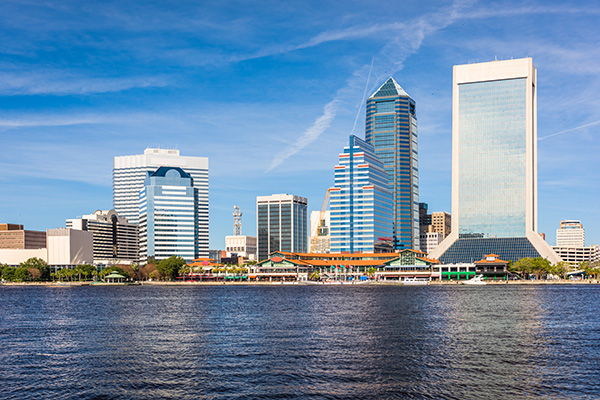
Jacksonville Multifamily: The pipeline in Jacksonville can be severely overstated.
We went through every project and said, “What has had a construction loan polled.” If we didn’t see that, we went on the public record and say, “Where has a notice of commencement been filed?” If neither of those have been issued that project likely isn’t coming to fruition anytime soon or may have been abandoned entirely. To your point,, we have seen a run-up in supply as rents have grown upwards of 40% here in Jacksonville since the onset of COVID. That’s invited a lot of developer interest here in Jacksonville.
Historically, it’s been hard to get those deals to pencil here because we’ve got the lowest class A rents and the entire Southeast. I mean any top 50 MSA in the country. All that makes the case for plenty of runway. It can be hard to get development deals to pencil. Fast forward to COVID, we get the big rent pop. A lot of developers flooding into the market. We went from developing 2700 units in 2021 to 2024, we’re going to do that 8300 units. We’ve absorbed it better than expected. Job and population growth here continues to trend roughly 30% of the pre-pandemic average in North Florida. We have seen rents essentially flat line and in some sub-markets turn negative, largely as a result of that oversupply, but if you look into 2025 and we show this on our report the pipelines going to go from 8300 deliveries in 2024 to under 3,000 in 2025.
That’s in large part due to these development deals not penciling out. That’s a life cycle. These development deals are longer. We’re looking at the horizon from 2025, 2026 and 2027. We’re expecting below-average deliveries in that time. We’re not expecting our population growth or job growth to fall off a cliff in the same way that the deliveries have. We’re expecting something like green in the latter half of 2025 once this current wave of supply has been absorbed rent growth to re-accelerate fairly quickly here.
I don’t think we’re getting back to the days of 23% rancorous and in 2021, but I think if you look closely at the data, you’d be reasonable to expect in a base case at least 3% growth, but very well likely, it could be a lot more. We’re at a snapshot in the cycle here that we’ve seen before and plenty of other markets where oversupply and elevated levels of vacancy and rent growth flatlining, but when the data is coming in like it is now we’re expecting supply and demand to fall much back into favor, which both as well for property owners like you all.
Interest Rate Predictions
Thanks for sharing all that. Before getting to the next segment of our show, let’s talk about some predictions. What is your prediction? You got your finger on the pulse of investors, of what’s happening, of Institutions. What is your prediction when it comes to interest rates? The markets are saying a 15% chance that might increase rates. What is your prediction when it comes to interest rates is the fact going to reduce rates and stay flat? What’s going to happen?
I got like to look at the data you had one of my favorites on. I love Peter Linneman’s data. I think there’s a lot of truth in it. If you peel back the layers of inflation. You see that it’s a few items that are driving it. Somehow, the cost of living in shelters is still at elevated levels. We’re looking at the coming announcement. Rent growth is negative and most sub-markets and most markets across the country. How can that be? If you look at headline inflation, it at least, covers around 3%. We’ve got a federal funds rate in the mid-five. That doesn’t doesn’t sound right.
I’ve maintained that the longer we go with this, the more likely it is that something breaks in the process, and the longer we stay at elevated levels of federal funding. I don’t know what that is. I go back to Jacksonville which has a very diverse and unstable employment base. I feel comfortable that if we do enter a recession, which I don’t think is likely, we will fare better than others, but I think as quickly as they can run up as they have here the treasury markets having the past 60 days, they can fall and the market is shown that they are very dated dependent.
I anticipate that we’ll end the year lower than we’re at now. I don’t think we’re going back to where we were pre-pandemic or elevated levels of government spending right now and a lot of ensuring which is not conducive to an extremely low-interest rate environment, but I can tell you that we will see a return to normal transaction levels and economic activity even if things stable out at levels where they are right now. As much as we don’t like how high interest rates are an equal if not greater driver of a lot of the activity or lack thereof has been all the volatility we’ve seen.
It’s hard to underwrite a deal when you’re looking at treasury markets and thinking, “I could put a deal under contract right now, but when I go to execute my loan application in 2 or 3 weeks from now, who knows we’re treasuries are going to be?” That’s keeping a lot of investors on the sidelines. It’s keeping a lot of sellers from putting their deals out there because we, as brokers could provide a BOV, which is driven by debt now more than ever in the current climate as most investors are solving for a fixed-rate debt solution agency if they can. That is a very interest rate and leverage-sensitive. I don’t think we need to see the 10-year drop to 3.5 before we see transaction levels normalize. If it normalized where it’s at now and we stopped seeing the intraday 10 basis 15 basis points swings, you could see a lot of investor confidence returned to the market.

Jacksonville Multifamily: It’s hard to underwrite a deal when you’re looking at treasury markets and thinking, “I could put a deal under contract right now, but when I go to execute my loan application in 2 or 3 weeks from now, who knows what our treasuries are going to be?”
Let’s get to our 10 Championship Rounds to Financial Freedom. Thank you for everything.
Are you ready? Whatever comes stop of mine. I’ll ask a series of questions.
Let’s do it. I’m ready for it.
First question, who’s been the most influential person in your life?
My dad. He’s the person who exposed me to real estate at a young age. He never was in brokerage, but taught me a lot of how to work with people and negotiate.
Next question. What is the number one book you’d recommend?
Probably, The One Minute Millionaire. Everybody says Rich Dad Poor Dad, but I like The One Minute Millionaire because it’s essentially 2 books in 1 where the left side page is to one story. The right side page is to another. They are telling us similar stories, but from one place to more left brain focus in one place to more. One is more fiction in the other is more nonfiction, but it’s all about doing the best you can with what you’ve got with an emphasis on financial freedom. I always enjoy that one.
I’ve never heard of that before. Next question. If you had the opportunity to travel back in time, what advice would you give your younger self?
I’ve heard people get this question before but I’ve never been asked it myself.
It’s funny because you started your real estate career so young, at eighteen.
Being in a sales position, there’s always doubt. I told myself what deals were going to trade and focus on prospecting those, but I would say, “Stick with it. Keep chopping wood,” which is something I still tell myself. I never thought I would be where I am at this point. I remind myself that you put your head down, you work and always have faith.
Being in a sales position, there's always doubt. You just have to put your head down, work, and always have faith. Click To TweetNext question. What’s the best investment you’ve ever made?
I want to say something that’s not like a stock. It’s probably my first pair of basketball shoes because I got those at a very young age. I’ll never forget them. They were shiny and they were red and that from a very young age started me on a path of always being healthy and fit which I take a lot of pride in. It helps me in more areas than one.
People invest in basketball shoes.
Health is everything. I couldn’t agree with you more. Next question. What’s the worst investment you’ve ever made and what lessons did you learn from it?
A stock that is no longer listed and I took the advice from somebody who had some personal relationships with the sea level team and he said he swore by it. The lesson I learned is I didn’t do anybody any research on it. I took their word for it and then ended up losing some money. The lesson there is always do your research.
Next question. How much would you need in the bank to retire today? What’s your number?
You’ve done a lot of high net worth investors types of people people who buy real estate for the cash flow, people who want to move their money 1031 exchange. You’ve been around lots of money and people in those situations, it’s very interesting to know your answer.
Two things. 1) I never plan on retiring and 2) I’m very young. I need to keep that in mind. We are in a much higher-yield environment now. Maybe it’s less than it was a few years ago when you were in zero percent interest. I would have to say seven figures but maybe not much beyond $1 million because I think now more than ever there’s a ton of opportunities out there even beyond real estate. If you do your homework, you can certainly find a way to sustain that. I’ll go with $1 million.
If you could have dinner with someone dead or alive, who would it be?
I read the biography of Alan Greenspan, which I was fascinated by with all this economic volatility and all the headwinds were facing now more than ever, maybe Peter Linneman. You had the fortunate opportunity to interview him. He would definitely be at that table if I had more than one seat, but I’ll say, Alan Greenspan.
Is he in the private sector now or were there any other big things he did?
He had a fantastic story being raced but he was the longest-serving fed chairman and saw through many market cycles. Cycles repeat themselves. I’m not sure what he’s up to, frankly, if he’s even alive still but I’m sure he’s got as much Insight on anybody economically at least.
Next question here. If you aren’t doing what you’re doing, what would you be doing now?
I’m usually on Sports. I love my Jacksonville Jaguars. I always said if I didn’t make it in real estate, I would try and work my way up through the NFL ranks and try and be in the front office somewhere.
Book smarts or street smarts.
One million percent, street smarts. I doubted many times that I’d even make it through college.
Look at where you are now. I love that awesome. Last question. If you had $1 million in cash and you had to make one investment today, what would it be?
I would probably go sponsor my own value-added multifamily deal, never sell it and take as much of the pie as could because everybody’s got their own investment appetite. I’ve seen a lot of our clients even still have had sales driven not necessarily by what they wanted to do, but they’ve got to cater to their investors. I would go find something in the path of progress whether it’s in North Florida or somewhere else. Park my money there and sink my teeth into it knowing that it’s a forever investment. Legacy asset.
Thank you so much. We appreciate your wisdom and I always enjoy our conversation.
What’s the best way that people can reach you?
I’m super active on LinkedIn or trying to be at least. Find me there. Shoot me an email at LM@NaiHallmark.com, if you’re interested in Jacksonville, or at the very least looking to learn more, I’m happy to send you our market research or hop on a call. Reach Out directly to me via email or LinkedIn.
We appreciate you. Thank you for being with us.
Thank you. I enjoyed it.
